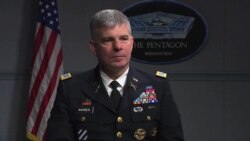The U.S. defense secretary was grilled by U.S. senators this week who said they weren't impressed by the Pentagon’s program to vet, arm and train moderate Syrian opposition fighters.
At a hearing before the Senate Armed Services Committee on Tuesday, Defense Secretary Ash Carter admitted that only 60 Syrians were currently undergoing training.
“That is a small class,” Carter told lawmakers. “We expect that number to improve."
Committee Chairman John McCain, an Arizona Republican who is one of the administration’s staunchest critics, expressed dissatisfaction with the number.
“Our means and our current level of effort are not aligned with our ends,” he told Carter at the Capitol Hill hearing. “That suggests we are not winning, and when you are not winning in war, you are losing.”
In his confirmation before the same committee, Marine Gen. Joseph Dunford, President Barack Obama’s nominee to chair the Joint Chiefs of Staff, also faced questions about Syria.
In his prepared testimony, Dunford said the military faced “significant challenges in recruiting and vetting suitable volunteers at the scale necessary to have strategic effects.” Dunford also said that, if confirmed, he would visit the region to evaluate the situation.
In January, the Pentagon estimated it would train 5,400 Syrian rebels before the end of the year, and Congress has allocated about $500 million to the program. Politico, a political journalism organization based in suburban Washington, quoted an unnamed congressional aide as saying that half of that amount had already been spent.
“There have been approximately 7,000 moderate Syrians who have volunteered for this training program, but what’s important is the way we vet them,” Pentagon spokesman Colonel Steve Warren told VOA.
Warren said that candidates must meet “very high standards”: Fighters must be able to abide by the rule of law, respect human rights and be competent fighters.
“It’s not that the requirements are high,” said Max Abrahms, assistant professor of political science at Northeastern University in Boston. “I don’t think we’ve been unable to find them due to a lack of looking. I think simply that the supply of moderate rebels is small.”
The situation is little different in Iraq, said Abrahms, where only 1,300 Sunnis have signed up for training by U.S. forces.
“The reality is that in both Iraq and in Syria, the Sunni population has not turned against the Islamic State,” he said.









